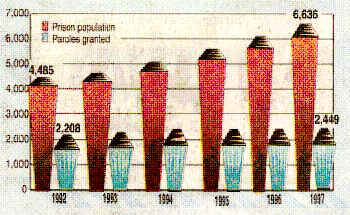
The Des Moines Register, Saturday, January 24, 1998, Page 1A
Paroles lag behind rise in inmatesBy WILLIAM PETROSKI
REGISTER STAFF WRITER
William Petroski can be reached
at
(515) 284-8547 or
petroskib@news.dmreg.com
500 lifers
Parole rates vs. prison population growth*
The Iowa Board of parole has increased the number of paroles granted annually by only 11 percent since 1992. Meantime, the prison population has soared by 48 percent.

* As of June 30 each year.
SOURCES: Iowa Board of Parole, Iowa Division of Criminal and Juvenile Justice Planning
| Time served prior to parole | |
| The following shows the average time served before paroles were granted for certain crimes in Iowa during the 1997 state fiscal year.* | |
| Distribution of a controlled substance in the vicinity of a school or a park | Four years, eight months |
| Attempt to commit murder | Eight years, six months |
| Second-degree murder | 17 years, 10 months |
| First-degree robbery | Nine years, nine months |
| Second-degree sexual abuse | Seven years, four months |
| Habitual felony offender | Eight years, 10 months |
| Second-degree arson | Three years, five months |
| Second-degree burglary | Four years, 11 months |
| Child endangerment, serious injury | Two years, seven months |
| Homicide by vehicle, under the influence or reckless | Three years, six months |
| Manufacture and delivery of a counterfeit drug | Four years, two months |
| Manufacture and delivery of a controlled substance | Two years, one month |
| Third-degree sexual abuse | Three years, seven months |
| First-degree theft | Three years, 10 months |
| Willful injury | Three years, 10 months |
| Third-degree burglary | Two years |
| Extortion | Two years, four months |
| Failure to obtain a controlled substance tax stamp | One year, eight months |
| Forgery | Two years |
| Going armed with intent | One year, seven months |
| Lascivious acts with a child | Two years, five months |
| Manufacture and delivery of marijuana, less than 50 kilos | One year, four months |
| Operating under the influence, third offense | One year |
| Receiving, transporting and possessing firearms and devices by a felon | One year, 11 months |
| Terrorism | Two years, six months |
| Second-degree theft | One year, 10 months |
| Driving motor vehicle while barred | Nine months |
| Operating vehicle without consent | 10 months |
| Operating while under the influence, second offense | Six months |
| Prostitution | 10 months |
| All paroles | Two years, three months |
| * Fiscal year 1997 ended June 30, 1997. | |
| Internet
access: http://www.innovlink.net/cgi-bin/ibop/homepage.cgi Offers a monthly update on inmates who are granted paroles and work release. |
|
SOURCE: Iowa Board of Parole
The Des Moines Register
Saturday, January 24, 1998, Page 1A
letters@news.dmreg.com